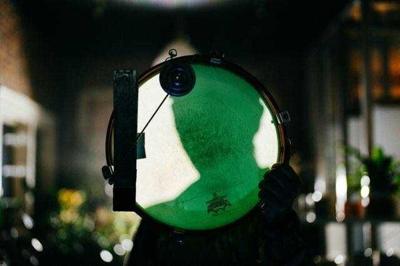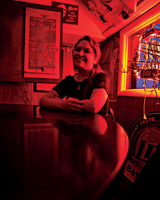
Improvisational music doesn’t resonate with everyone — either audiences or musicians — to the point that if making music in the moment is something that inspires you, it can be tough to find others to enjoy it with. Enter Pulled From the Sky, an occasional series organized by musician Caleb Breaux, whose goal is to build community around improv music in Nashville. The folks playing at the next installment of the series — starting at 8 p.m. on Wednesday at Betty's, it's the seventh since the inaugural PFTS in October 2021 — aren’t exclusively improvisers, and they bring lots of different perspectives to the process.
The bill includes a solo performance by guitarist (and Scene contributing editor) Jack Silverman, whose style includes lots of modal melodies and ideas from jazz. Tommy Stangroom performs here as Tommy C; among other things, you might have seen him playing drums with punk and psych bands like Roadblock and Supermelt, or heard him as one-half of harp-centric duo Glimmering. Images in Silence is a project of Jesse Weilburg, another longtime local musician who also co-founded the Trance // Furnace label; IIS leans toward soundscapes inspired by industrial music.
Breaux himself will also perform under the moniker Brainweight, his name for his multifaceted artistic undertaking that includes electronic composition, original field recordings of natural sounds, live drumming and more. Filmmaker and Butthole bandleader Helen Gilley, aka VJJ Helly, will improvise projected visuals along with the show.
Breaux grew up in Baker, La., just outside Baton Rouge, and he moved to Nashville more than a decade ago without intending to pursue music. But he found himself in musical circles anyway, and it's been an inspiring experience. He kindly hopped on the phone to answer a few questions about Pulled From the Sky. Check out a portion of our conversation.
Tell me a little about your musical background.
My dad is a singer-songwriter and my mom was a percussionist-drummer. They actually played together a little bit when they were in their early 20s. I was always kind of surrounded by music. My dad converted our garage into a home studio, so there were always musical instruments around and everything, and they were always very encouraging with learning how to play something. I kind of went for the drums, just because every child grows up hitting pots and pans, but I was actually fortunate enough to have an actual drum kit around, you know? I was able to sort of dive into that a little bit. And the older I got, the drumming thing just kind of stuck with me. I think it’s because I was actually birthed from a drummer. That rhythm was always kind of there, and I was always drawn to pulsing rhythms and interesting patterns and things like that. …
I came to this realization recently that I was actually manipulating sound and doing field recordings as a kid because — do you remember those Yak Bak toys? … I had a bunch of those things, so I was recording sound and I became very interested in sound manipulation [without knowing about its artistic applications].
I got a drum teacher when I was an early teenager and started playing in the church a little bit, which I really loved because it taught me how to play in front of a crowd, and it also taught me how to play with a click. … I’m not religious at all anymore, I’d say more spiritual than anything, but those fundamental lessons from church were very valuable at the time, and I’m still very thankful that I was able to grow up in that type of environment.
In my early 20s I moved to Nashville, and I didn’t really think that I would take music seriously here, even though that’s obviously what most people move here for. I actually moved here with no instruments at all, and then I ended up falling into a pocket of friends that needed a drummer and things like that. So then I started playing again and it kind of came back to me. I did the hired-gun thing for a while, and then I sort of started getting more interested in trying to make my own sound and my own type of project. …
I like to say that Brainweight kind of blankets a lot of things. It’s my drumming, it’s my experimentation, it’s beatmaking projects, it’s field recording, sound design — you know, kind of everything. I do some video manipulation stuff here and there too, so it’s kind of, like, all-encompassing and brings all that together for me. I’ve always wanted that project to be all that, in some shape or form — I only have so much bandwidth, so I can’t always put it together all the time. And I’m constantly trying to develop all of it too, so … it’s all the things I’m most interested in, but it’s also going to take me a while to hone it all in. …
I’ve been here 11 years now, and living in Nashville — it’s such a treat, you know? It’s given me so many opportunities to try things with other musicians — great musicians — and other artists here. I’ve just been able to connect with people through music and or experimentation.
How have those collaborations shaped Brainweight?
I don’t want to sound selfish and say that I’m trying to use friends to develop my own sound or whatever, but I think when you become friends with creative people, it’s naturally going to rub off on you if you’re a fellow creative. I try to keep friends around that are inspiring … it helps me or pushes me to develop what I’m trying to do. Those friendships are extra valuable, and people that come to mind right now are my buddy JayVe Montgomery [of Abstract Black, In Place Quartet and more] … and then my buddy Paul DeFiglia — he plays upright bass in a trio with me. I grew up loving early ’90s hip-hop and things like that, and I tried my hand at DJing for a little bit, and we really connect on that. When I first started hanging out with him, we kind of jammed around on samplers and things for a little bit, and he showed me his massive record collection, and it was just like instant friendship, you know? Instant connection.
And my friend Andie Billheimer, she is just the most creative person I know. Super inspiring person, always putting together incredible jazz bands and very into the experimental world, and just has such an interesting ear and take on sound. I just love her so much. Long story short: trying to keep those people around, you know? Because they’re all so inspiring and they’re so sweet. … I mean they are such sweet people as well, like even if the music wasn’t part of it, I would want to be around them anyway because we connect on something. It’s just beautiful.
The goal of Pulled From the Sky is bolstering the community around improvisational music. What kind of barriers have you found to achieving that?
I’m always attracted to sort of oddball people and weirdos, and just different types of people. I’m very interested in different approaches to things, and I wanted to create a safe space with Pulled From the Sky to kind of let people try out unstructured music — and also give people a reason to enjoy it, and a space. It’s sort of hard to just put together a show of improv stuff, because it’s a very niche thing and it’s not accepted by everyone. I think that once you keep something going, people stay interested, because they see that it’s still going and it’s not just a one-off thing. I think that the fact that we’ve kept it consistent and we keep it diverse, I think that’s really helped us. …
Obviously it’s not for everyone. I kind of wanted to keep it in a small space that was accepting of what we were doing. Shoutout Bailey at Betty’s for being so cool about everything, because from the first one she was like, “I’ve really been wanting to do something like this here,” and she didn’t know if it would go over well. She used to live in Chicago, and she did some DIY venues up there, and she’s actually an experimental musician herself, I think. But she’s been such a great contributor to the event itself, because she just gets what we’re doing. Betty’s has a very specific built-in crowd. … You know, they’re not into it, but she will kind of make sure that they’re respectful, and if they get too rowdy or whatever she’ll tell them to leave, you know. So that helps a lot with weeding out the types of people who might not enjoy it too much. But that’s only if they are being disruptive or whatever.
We’ve been surprised by how many people show up to these things. It’s been wild how naturally it’s grown, and it’s pretty much by word of mouth and Instagram. … This was always just kind of a passion project to see if it would work. And the fact that it is still working is surprising, but also it’s the reason I keep doing it, because people are enjoying it and I’m enjoying it, so I’m able to help curate a show that’s different for this town. I don’t think Nashville has much like this, other than Chris at FMRL, who’s doing some really inspiring jazz and improv shows and things like that. He’ll get really incredible artists in town, and he’s done lots of shows [at Betty’s] too. I’m definitely inspired by him, with the experimental scene here. Because before I met JayVe, I didn’t even know that music like this existed here, and it kind of just opened my whole mind up to it. And I wanted to share that same feeling with other people.








